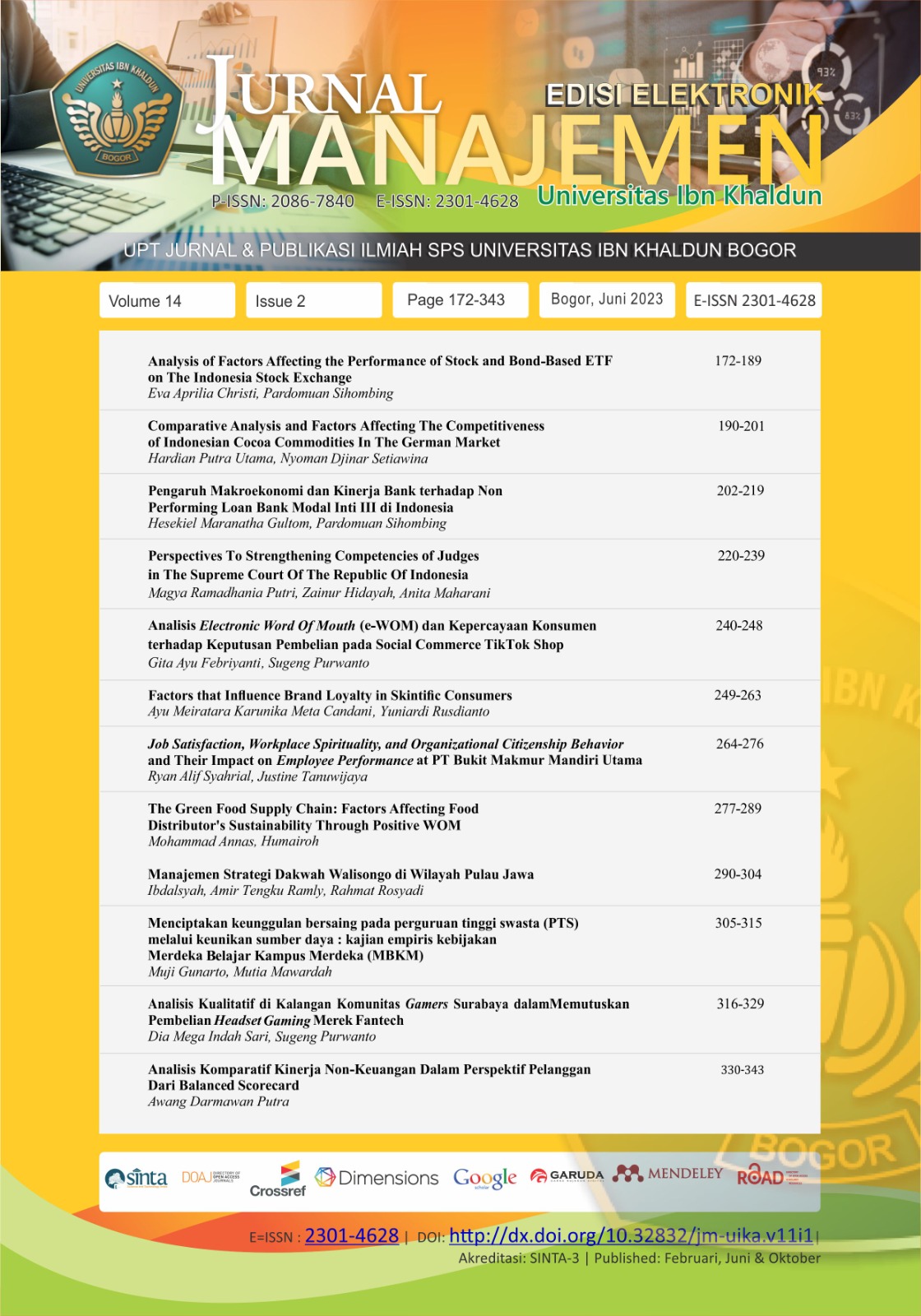Menciptakan Keunggulan Bersaing pada Perguruan Tinggi Swasta (PTS) Melalui Keunikan Sumber Daya: Kajian Empiris Kebijakan Merdeka Belajar Kampus Merdeka (MBKM)
DOI:
https://doi.org/10.32832/jm-uika.v14i2.9399Keywords:
Keunggulan bersaing, keunikan sumber daya, kolaborasi perguruan tinggiAbstract
Kebijakan Merdeka Belajar Kampus Merdeka (MBKM) mendorong perguruan tinggi untuk meningkatkan kolaborasi. Tujuan penelitian ini adalah untuk mengkaji dampak keunikan sumber daya untuk menciptakan keunggulan bersaing Perguruan Tinggi Swasta di Kota Palembang. Metode penelitian dilakukan dengan pendekatan kuantitatif melalui survei terhadap 104 responden pada beberapa PTS di Kota Palembang. Teknik sampling yang digunakan secara stratified random sampling. Teknik analisis data dilakukan dengan pendekatan model persamaan struktural (SEM) dengan bantuan program LISREL. Hasil penelitian menunjukkan bahwa keunikan sumber daya berpengaruh signifikan terhadap kolaborasi, dan kolaborasi berpenagruh terhadap keunggulan bersaing perguruan tinggi. Semakin unik sumber daya yang dimiliki PTS maka akan membuka peluang meningkatnya kolaborasi dan pada ahirnya mampu menciptakan keunggulan bersaing PTS. Namun keunggulan bersaing tidak berpengaruh signifikan secara langsung terhadap keunggulan bersaing, artinya bahwa kolaborasi menjadi variabel intervening yang baik bagu keunikan sumber daya terhadap keunggulan bersaing PTS.References
AAKER, D. A. & MOORMAN, C. 2017. Strategic Market Management, New York, John Wiley&Sons.
ADAMS, R., JEANRENAUD, S., BESSANT, J., DENYER, D. & OVERY, P. 2016. Sustainability-oriented Innovation: A Systematic Review. International Journal of Management Reviews, 18, 25.
ALMEID, J. M. G. D., GOHR, C. F., MORIOKA, S. N. & NOBREGA, B. M. D. 2020. Towards an integrative framework of collaborative capabilities for sustainability: A systematic review and research agenda. Journal of Cleaner Production, 279.
ANNUNZIATA, E., PUCCI, T., FREY, M. & ZANNI, L. 2018. The role of organizational capabilities in attaining corporate sustainability practices and economic performance: evidence from Italian wine industry. Journal of Cleaner Production, 171, 11.
ASTUTY, E., NURA, A. & GUNARTO, M. The Institutional Strategy in Increasing Publication Performance. 2016 Global Conference on Business, Management and Entrepreneurship, 2016. Atlantis Press.
BARNEY, J. 1991. Firm resources and sustained competitive advantage. Journal of Management, 17, 21.
DAVID, F. R. & DAVID, F. R. 2017. Strategic management concepts and cases: A Competitive Advantage Approach, England, Pearson Education Limited.
DWIVEDI, R., AGARWAL, A. & CHAKRABORTY, S. 2015. Application of Activity based Costing and Balanced Scorecard Models in a Biscuit Industry for Sustainable Competitive Advantage. Journal of Advanced Research in Management, VI, 9.
GUNARTO, M. 2018. Analisis Statistika dengan Model Persamaan Struktural (SEM): Teoritis dan Praktis, Bandung, Alfabeta.
GUNARTO, M. & HURRIYATI, R. 2020. Creating Experience Value To Build Student Satisfaction In Higher Education. Dinasti International Journal of Education Management And Social Science, 1, 10.
GUNARTO, M., HURRIYATI, R., DISMAN & WIBOWO, L. A. 2018a. Building students' loyalty in private higher education institutions: activities for competitiveness Int. J. Education Economics and Development, 9, 394-410.
GUNARTO, M., HURRIYATI, R., DISMAN, WIBOWO, L. A. & NATALISA, D. Building Student Satisfaction at Private Higher Education through Co-creation with Experience Value as Intervening Variable. Proceedings of the International Conference on Industrial Engineering and Operations Management, 2018b Bandung IEOM Society.
GUNARTO, M., NUGRAHA, D. Y. & GAFFAR, V. Analysis of Perception and Public Preference on Reputation of Higher-Education Ranking Agencies. 2016 Global Conference on Business, Management and Entrepreneurship, 2016a. Atlantis Press.
GUNARTO, M., WIBOWO, L. A. & HURRIYATI, R. Creating Students Loyalty Model in Private Higher Education. 2016 Global Conference on Business, Management and Entrepreneurship, 2016b Bandung. Atlantis Press.
HITT, M. A., IRELAND, R. D. & HOSKISSON, R. E. 2007. Strategic Management: Competitiveness and Globalization (Concepts and Cases), Thomson Learning, Inc.
HOFFMAN, N. P. 2000. An Examination of the "Sustainable Competitive Advantage" Concept: Past, Present, and Future Academy of Marketing Science Review, 2000.
Hí–RISCH, J., JOHNSON, M. P. & SCHALTEGGER, S. 2015. Implementation of Sustainability Management and Company Size: A Knowledge-Based View. Business Strategy and the Environment, 24, 765-779.
HUANG, K.-F., DYERSON, R., WU, L.-Y. & HARINDRANATH, G. 2015. From Temporary Competitive Advantage to Sustainable Competitive Advantage. British Journal of Management, 26, 617-636.
MACCARTHY, B. L. & JAYARATHNE, P. G. S. A. 2012. Sustainable collaborative supply networks in the international clothing industry: a comparative analysis of two retailers. Production Planning & Control: The Management of Operations, 23, 16.
MIOTTO, G., DEL-CASTILLO-FEITO, C. & BLANCO-GONZíLEZ, A. 2019. Reputation and legitimacy: Key factors for Higher Education Institutions' sustained competitive advantage. Journal of Business Research.
SANDERS, J. S. & WONG, T. 2020. International partner selection among higher education institutions in Hong Kong, Singapore and Japan: a resource-based view. Journal of Higher Education Policy and Management.
VARADARAJAN, R. 2020. Customer information resources advantage, marketing strategy and business performance: A market resources based view. Industrial Marketing Management.
WHEELEN, T. L. & HUNGER, J. D. 2015. Strategic Management and Business Policy: TOWARD GLOBAL SUSTAINABILITY, New York, Prentice Hall.
Downloads
Published
How to Cite
Issue
Section
License
Copyright (c) 2023 Jurnal Manajemen (Edisi Elektronik)

This work is licensed under a Creative Commons Attribution-NonCommercial 4.0 International License.
Authors who publish with this journal agree to the following terms:
- Authors retain copyright and grant the journal right of first publication with the work simultaneously licensed under a Creative Commons Attribution-NonCommercial-ShareAlike 4.0 International License that allows others to share the work with an acknowledgement of the work's authorship and initial publication in this journal.
- Authors can enter into separate, additional contractual arrangements for the non-exclusive distribution of the journal's published version of the work (e.g., post it to an institutional repository or publish it in a book), with an acknowledgement of its initial publication in this journal.
- Authors are permitted and encouraged to post their work online (e.g., in institutional repositories or on their website) prior to and during the submission process, as it can lead to productive exchanges, as well as earlier and greater citation of published work (See The Effect of Open Access).











